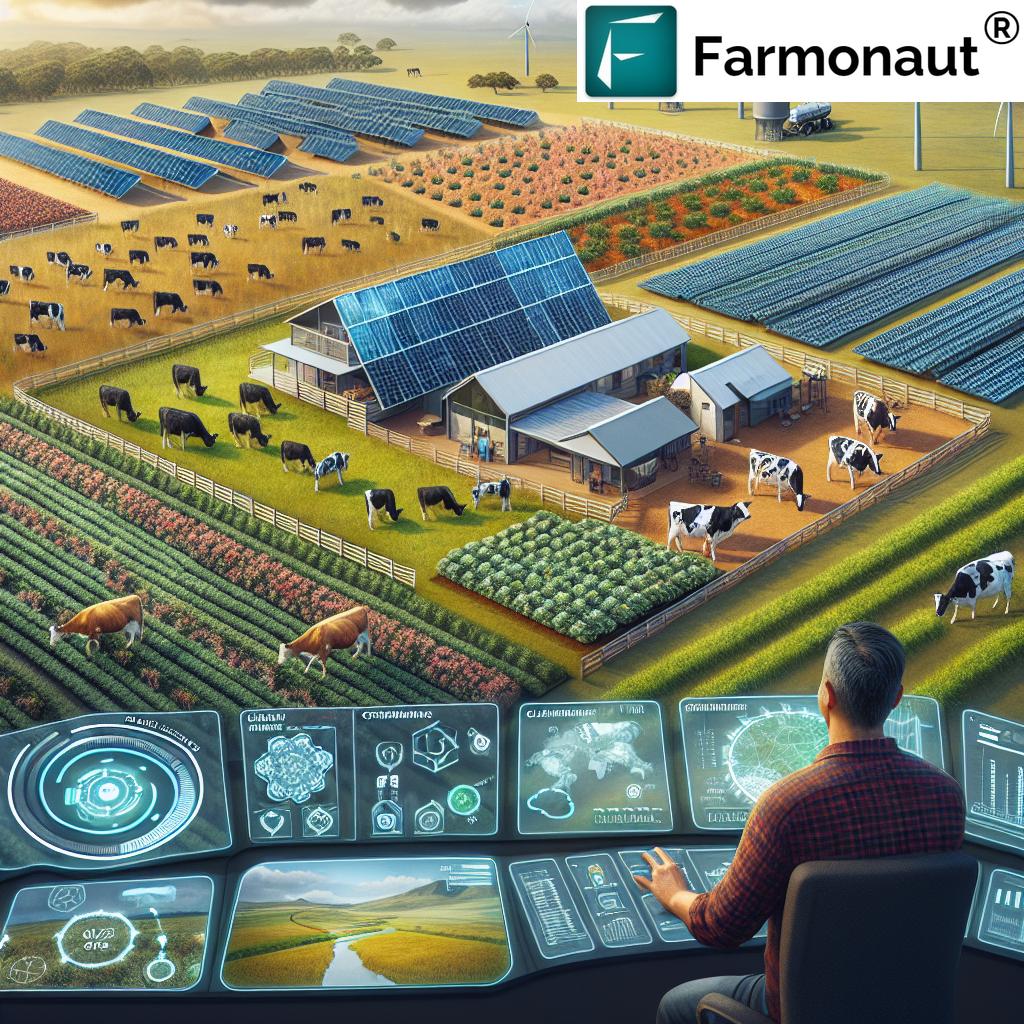Farmonaut: Revolutionizing Australian Agriculture with Climate-Smart Tools for Enhanced Sustainability and Productivity
“Australian farmers adopting climate-smart agriculture techniques have seen up to 30% increase in crop yields.”
Welcome to our comprehensive exploration of how climate resilience is reshaping Australian agriculture. At Farmonaut, we’re at the forefront of this agricultural revolution, providing cutting-edge tools and insights to help farmers adapt to changing climate conditions while boosting productivity and sustainability.

In this blog post, we’ll delve into the world of climate-smart agriculture, examining sustainable farming practices, innovative technologies, and the challenges faced by Australian producers. Our goal is to provide you with valuable insights that will help shape the future of farming in Australia and beyond.
The Rise of Climate-Smart Agriculture in Australia
Climate-smart agriculture (CSA) is an approach that helps transform agricultural systems to support food security under the new realities of climate change. In Australia, where extreme weather events and prolonged droughts have become increasingly common, CSA is not just a buzzword – it’s a necessity.
- Precision Agriculture: Utilizing advanced technologies to optimize resource use
- Soil Health Management: Focusing on building organic matter and improving soil structure
- Water Conservation: Implementing efficient irrigation systems and drought-resistant crops
- Emissions Reduction: Adopting practices that minimize greenhouse gas emissions
At Farmonaut, we’re proud to offer cutting-edge solutions that support these climate-smart practices. Our satellite-based crop health monitoring system provides real-time insights into vegetation health, soil moisture levels, and other critical metrics. This data empowers farmers to make informed decisions about irrigation, fertilizer usage, and pest management, ultimately optimizing crop yields and reducing resource wastage.
Sustainable Farming Practices: The Australian Way
Australian farmers are increasingly adopting sustainable farming practices to ensure long-term productivity and environmental stewardship. These practices not only help in mitigating climate change impacts but also contribute to the overall health of the agricultural ecosystem.
- Conservation Tillage: Reducing soil disturbance to improve soil health and water retention
- Crop Rotation: Enhancing soil fertility and breaking pest cycles
- Cover Cropping: Protecting soil from erosion and improving organic matter content
- Integrated Pest Management: Using biological controls and targeted pesticide application
- Agroforestry: Incorporating trees into farming systems for improved biodiversity and carbon sequestration
Our Jeevn AI Advisory System at Farmonaut plays a crucial role in supporting these practices. By analyzing satellite data and other inputs, it generates customized advice on crop management strategies, helping farmers implement sustainable practices effectively.
Challenges in Adopting Environmental Compliance Measures
“Over 75% of surveyed Australian producers face challenges in implementing environmental compliance measures.”
While the benefits of climate-smart agriculture are clear, many Australian producers face significant challenges in adopting environmental compliance measures. These obstacles include:
- Financial Constraints: High initial costs for implementing new technologies and practices
- Knowledge Gaps: Lack of information or training on new sustainable methods
- Regulatory Complexity: Navigating complex and sometimes conflicting environmental regulations
- Time and Labor Intensiveness: Some sustainable practices require more time and labor to implement
- Market Uncertainties: Concerns about the marketability of sustainably produced goods
At Farmonaut, we understand these challenges and strive to provide accessible, user-friendly solutions. Our platform is designed to be cost-effective and easy to integrate into existing farm management systems, helping producers overcome some of these barriers to adoption.
Explore Farmonaut’s API for Advanced Integration
Emissions Monitoring: A Key to Sustainable Agriculture
Monitoring and reducing agricultural emissions is crucial for creating a more sustainable farming sector. In Australia, where agriculture accounts for a significant portion of the country’s greenhouse gas emissions, effective monitoring tools are essential.
Farmonaut’s Carbon Footprinting feature provides real-time data on emissions, allowing agribusinesses to:
- Track their environmental impact accurately
- Identify areas for improvement in their operations
- Implement targeted strategies to reduce emissions
- Comply with environmental regulations more effectively
- Demonstrate their commitment to sustainability to consumers and stakeholders
By leveraging these tools, Australian farmers can not only reduce their environmental impact but also potentially access new markets and financial incentives tied to sustainable practices.
Precision Agriculture: The Future of Farming
Precision agriculture is at the heart of climate-smart farming, and it’s an area where Australia is making significant strides. This approach uses technology to make farming more accurate and controlled, resulting in increased productivity and reduced environmental impact.
Key aspects of precision agriculture include:
- GPS-guided machinery: For precise planting, spraying, and harvesting
- Variable Rate Technology (VRT): Applying inputs at variable rates across a field
- Remote sensing: Using satellite and drone imagery for crop monitoring
- Soil sampling and mapping: For targeted soil management
- Weather stations: Providing localized climate data for informed decision-making
Farmonaut’s platform integrates seamlessly with these precision agriculture techniques. Our satellite-based crop health monitoring system provides high-resolution data that can be used to create precise application maps for fertilizers and pesticides, optimizing resource use and minimizing environmental impact.
Access Farmonaut’s API Developer Docs for Advanced Integration
Innovative Farm Management Technologies
The agricultural sector is experiencing a technological revolution, with innovative farm management technologies playing a crucial role in enhancing sustainability and productivity. These technologies are helping Australian farmers make more informed decisions, optimize resource use, and adapt to changing climate conditions.
Some key technologies revolutionizing farm management include:
- IoT sensors: For real-time monitoring of soil moisture, temperature, and crop health
- AI and Machine Learning: For predictive analytics and automated decision-making
- Blockchain: For improved traceability and supply chain management
- Robotics: For automated planting, harvesting, and weed control
- Big Data Analytics: For processing and interpreting large volumes of farm data
Farmonaut’s platform harnesses the power of these technologies to provide comprehensive farm management solutions. Our AI-driven Jeevn advisory system, for instance, analyzes multiple data sources to provide personalized recommendations for crop management, helping farmers optimize their operations for maximum sustainability and productivity.
Enhancing Agricultural Productivity with Climate-Smart Tools
Climate-smart tools are instrumental in boosting agricultural productivity while addressing climate change impacts. These tools help farmers make data-driven decisions, optimize resource use, and adapt to changing environmental conditions.
Some essential climate-smart tools include:
- Crop modeling software: For simulating crop growth under different climate scenarios
- Weather forecasting systems: For improved planning and risk management
- Water management tools: For optimizing irrigation and reducing water waste
- Soil health monitoring devices: For maintaining optimal soil conditions
- Emissions calculators: For tracking and reducing greenhouse gas emissions
Farmonaut’s platform integrates many of these tools, providing a comprehensive solution for climate-smart agriculture. Our satellite-based monitoring system, combined with AI-driven insights, enables farmers to track crop health, predict yields, and optimize resource allocation – all crucial factors in enhancing productivity in the face of climate challenges.
The Role of Data in Creating a Climate-Resilient Food System
Data is the cornerstone of climate-smart agriculture and a key component in building a resilient food system. By collecting, analyzing, and interpreting vast amounts of agricultural data, we can gain valuable insights into climate patterns, crop performance, and resource efficiency.
Here’s how data contributes to climate resilience in agriculture:
- Predictive Analytics: Forecasting climate trends and potential risks
- Performance Tracking: Monitoring crop yields and resource use efficiency
- Benchmarking: Comparing farm performance against industry standards
- Decision Support: Providing data-driven recommendations for farm management
- Policy Formulation: Informing evidence-based agricultural policies
At Farmonaut, we’re committed to harnessing the power of data for sustainable agriculture. Our platform collects and analyzes data from various sources, including satellite imagery, weather stations, and on-farm sensors, to provide comprehensive insights that drive climate-smart decision-making.
Climate-Smart Agriculture Techniques in Australia
| Technique | Description | Benefits | Adoption Rate (%) |
|---|---|---|---|
| Precision Agriculture | Using technology to make farming more accurate and controlled | Increased efficiency, reduced waste, higher yields | 35 |
| Soil Health Management | Practices to improve soil structure and organic matter content | Better water retention, increased fertility, carbon sequestration | 50 |
| Water Conservation | Efficient irrigation systems and drought-resistant crops | Reduced water usage, drought resilience | 60 |
| Emissions Reduction | Practices to minimize greenhouse gas emissions from farming | Lower carbon footprint, potential carbon credits | 25 |
| Crop Diversification | Growing a variety of crops to spread risk and improve soil health | Increased biodiversity, pest resistance, income stability | 40 |
The Future of Australian Agriculture: Trends and Predictions
As we look to the future of Australian agriculture, several key trends and predictions emerge:
- Increased Adoption of AgriTech: More farmers will embrace technological solutions for farm management
- Focus on Regenerative Agriculture: Practices that restore and enhance ecosystem services will gain popularity
- Expansion of Carbon Farming: More farmers will participate in carbon markets through sequestration practices
- Diversification of Crops: Climate change will drive the adoption of new, more resilient crop varieties
- Emphasis on Water Efficiency: Advanced water management techniques will become crucial in drought-prone areas
Farmonaut is committed to staying at the forefront of these trends, continuously updating our platform to meet the evolving needs of Australian farmers. Our focus on satellite-based monitoring, AI-driven insights, and blockchain traceability positions us well to support the future of climate-smart agriculture in Australia.
Conclusion: Building a Sustainable Future for Australian Agriculture
The journey towards a more sustainable and climate-resilient agricultural sector in Australia is well underway. By embracing climate-smart practices, leveraging innovative technologies, and focusing on data-driven decision-making, Australian farmers are paving the way for a more productive and environmentally friendly future.
At Farmonaut, we’re proud to be part of this transformation. Our comprehensive platform offers the tools and insights needed to navigate the challenges of climate change while optimizing farm productivity. From satellite-based crop monitoring to AI-powered advisory systems, we’re committed to supporting Australian farmers every step of the way.
As we move forward, collaboration between farmers, technology providers, researchers, and policymakers will be crucial in creating a truly resilient and sustainable agricultural sector. Together, we can ensure that Australian agriculture not only survives but thrives in the face of climate change, continuing to feed the nation and the world for generations to come.

Farmonaut Subscriptions
Frequently Asked Questions
Q: What is climate-smart agriculture?
A: Climate-smart agriculture (CSA) is an approach that helps transform agricultural systems to support food security under the new realities of climate change. It focuses on increasing productivity sustainably, adapting to climate change, and reducing greenhouse gas emissions where possible.
Q: How does Farmonaut support sustainable farming practices?
A: Farmonaut provides satellite-based crop health monitoring, AI-driven advisory systems, and resource management tools that help farmers implement sustainable practices more effectively. Our platform enables data-driven decision-making for optimal resource use and reduced environmental impact.
Q: What are some challenges Australian farmers face in adopting climate-smart practices?
A: Some key challenges include financial constraints, knowledge gaps, regulatory complexity, time and labor intensiveness, and market uncertainties. Farmonaut aims to address these by providing cost-effective, user-friendly solutions that integrate easily into existing farm management systems.
Q: How does precision agriculture contribute to sustainability?
A: Precision agriculture uses technology to make farming more accurate and controlled. This leads to increased efficiency, reduced waste, and higher yields, all while minimizing environmental impact through targeted use of resources like water and fertilizers.
Q: What role does data play in creating a climate-resilient food system?
A: Data is crucial for predictive analytics, performance tracking, benchmarking, decision support, and policy formulation. By collecting and analyzing vast amounts of agricultural data, we can gain valuable insights into climate patterns, crop performance, and resource efficiency, enabling more informed and sustainable farming practices.






